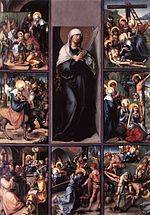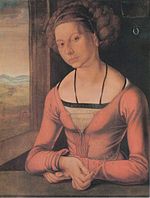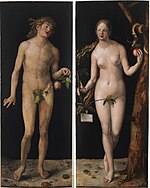The following is an incomplete list of paintings by the German painter and engraver Albrecht Dürer.
| Image | Title | Year | Technique | Dimensions | Gallery |
|---|---|---|---|---|---|
 |
Portrait of Barbara Dürer (diptych wing) | 1490 | Oil on panel | 47 × 38 cm | Germanisches Nationalmuseum, Nuremberg |
 |
Portrait of Dürer's Father (diptych wing) | 1490 | Oil on panel | 47.5 × 39.5 cm | Uffizi, Florence |
 |
Alliance Coat of Arms of the Dürer and Holper Families | 1490 | Oil on panel | 47 × 39 cm | Uffizi, Florence |
 |
Self-portrait | 1493 | Oil on linen, transferred from vellum | 56.5 × 44.5 cm | Musée du Louvre, Paris |
 |
Man of Sorrows | 1493 c. | Oil on panel | 30 × 19 cm | Staatliche Kunsthalle Karlsruhe |
 |
Virgin and Child before an Archway | 1495 c. | Oil on panel | 48 × 36 cm | Magnani-Rocca Foundation, Mamiano di Traversetolo near Parma |
 |
Portrait of Elector Frederick the Wise of Saxony | 1496 | Tempera on canvas | 76 × 57 cm | Gemäldegalerie, Berlin |
 |
Dresden Altarpiece | 1496 | Oil on canvas | 117 × 96.5 cm (central panel), 114 × 45 cm (each wing) | Gemäldegalerie Alte Meister, Dresden |
 |
Saint Jerome in the Wilderness | c. 1496 | Oil on panel | 23 × 17 cm | National Gallery, London |
 |
Heavenly scene | c. 1496 | Oil on panel | 23 × 17 cm | National Gallery, London |
 |
The Seven Sorrows of the Virgin | 1496 c. | Oil on panel | 109 × 43 cm (central panel), 63 × 46 cm (each side panel) | Alte Pinakothek, Munich and Gemäldegalerie Alte Meister, Dresden |
 |
The Painter's Father [attributed or copy] | 1497 | Oil on panel | 51 × 40.3 cm | National Gallery, London |
 |
Portrait of a Young Woman | 1497 | Oil on canvas | 56 × 43 cm | Städel, Frankfurt |
 |
Portrait of a Young Fürleger with Her Hair Done Up | 1497 | Oil on canvas | 56.5 × 42.5 cm | Berlin State Museums |
 |
Portrait of a Man | 1497–98 | Oil on parchment on panel | 24.2 × 20 cm | Heinz Kisters Collection, Kreuzlingen |
 |
Self-Portrait | 1498 | Oil on panel | 52.5 × 41 cm | Museo del Prado, Madrid |
 |
Lamentation | 1498 | Oil on panel | 147 × 118 cm | Germanisches Nationalmuseum, Nuremberg |
 |
Madonna and Child | 1496–1499 | Oil on panel | 52.4 × 42.2 cm | National Gallery of Art, Washington |
 |
Lot and His Daughters | 1496–1499 | Oil on panel | 52.4 × 42.2 cm | National Gallery of Art, Washington |
 |
Combined Coat-of-Arms of the Tucher and Rieter Families | 1499 | Oil on panel | 28 × 24 cm | Schlossmuseum, Weimar |
 |
Hans Tucher | 1499 | Oil on panel | 28 × 24 cm | Schlossmuseum, Weimar |
 |
Felicitas Tucher, née Rieter | 1499 | Oil on panel | 28 × 24 cm | Schlossmuseum, Weimar |
 |
Portrait of Elsbeth Tucher, née Pusch | 1499 | Oil on panel | 29 × 23 cm | Staatliche Kunstsammlungen, Kassel |
 |
Portrait of Oswolt Krel | 1499 | Oil on panel | 50 × 39 cm (central), 50 × 16 cm (each side panel) | Alte Pinakothek, Munich |
 |
Portrait of St Sebastian with an Arrow | 1499 c. | Oil on panel | 52 × 40 cm | Accademia Carrara, Bergamo |
 |
Self-Portrait with Fur-Trimmed Robe | 1500 | Oil on panel | 67.1 × 48.9 cm | Alte Pinakothek, Munich |
 |
Heracles and the Stymphalian birds | 1500 | Oil on panel | 87 × 110 cm | Germanisches Nationalmuseum, Nuremberg |
 |
Paumgartner Altar | 1500 c. | Oil on panel | 155 × 126.1 cm (central), 151 × 61 cm (each wing) | Alte Pinakothek, Munich |
 |
Lamentation for Christ | 1500–1503 | Oil on panel | 151 × 121 cm | Alte Pinakothek, Munich |
 |
Madonna and Child at the Breast | 1503 | Oil on panel | 24.1 cm × 18.3 cm | Kunsthistorisches Museum, Vienna |
 |
Jabach Altarpiece | c. 1503–1504 | Oil on panel | 94 × 51 cm (left), 94 x 57 cm (right) | Städel, Frankfurt and Wallraf-Richartz Museum, Cologne |
 |
Adoration of the Magi | 1504 | Oil on panel | 99 × 113.5 cm | Uffizi, Florence |
 |
Portrait of a Man | 1504 c. | Oil on panel | 43 × 29 cm | Museum of Fine Arts, Budapest |
 |
Portrait of a Venetian Woman | 1505 | Oil on panel | 32.5 × 24.5 cm | Kunsthistorisches Museum, Vienna |
 |
Salvator Mundi [unfinished] | 1505 | Oil on panel | 58.1 × 47 cm | Metropolitan Museum of Art, New York |
 |
Portrait of Burkard von Speyer | 1506 | Oil on panel | 31.7 × 26 cm | Royal Collection |
 |
Feast of the Rose Garlands | 1506 | Oil on panel | 162 × 194.5 cm | National Gallery in Prague |
 |
Portrait of a Young Man | 1506 | Oil on panel | 50 × 40 cm | Palazzo Rosso, Genoa |
 |
Madonna with the Siskin | 1506 | Oil on panel | 91 × 76 cm | Berlin State Museums |
 |
Christ Among the Doctors | 1506 | Oil on panel | 64.3 × 80.3 cm | Thyssen-Bornemisza Museum, Madrid |
 |
Portrait of a Venetian Woman | 1506–1507 | Oil on panel | 28.5 × 21.5 cm | Berlin State Museums |
 |
Adam and Eve | 1507 | Oil on panel | 209 × 81 cm (each panel) | Museo del Prado, Madrid |
 |
Portrait of a Young Man | 1507 | Oil on panel | 35 × 29 cm | Kunsthistorisches Museum, Vienna |
 |
Allegory of Avarice | 1507 | Oil on panel | 35 × 29 cm | Kunsthistorisches Museum, Vienna |
 |
Portrait of a Young Girl | 1507 | Oil on panel transferred from parchment | 30 × 20 cm | Berlin State Museums |
 |
The Martyrdom of the Ten Thousand | 1508 | Oil on canvas transferred from panel | 101 × 89 cm | Kunsthistorisches Museum, Vienna |
 |
Heller Altar [copy] | 1508–1509 | Tempera and oil on panel | 189 × 138 cm (central element) | Historical museum, Frankfurt |
 |
Holy Family | 1509 | Oil on panel | 31 × 39 cm | Museum Boijmans Van Beuningen, Rotterdam |
 |
The Adoration of the Trinity (Landauer Altar) | 1511 | Oil on panel | 135 × 123.4 cm | Kunsthistorisches Museum, Vienna |
 |
Madonna of the Pear | 1512 | Oil on panel | 49 × 37 cm | Kunsthistorisches Museum, Vienna |
 |
Emperor Charlemagne and Emperor Sigismund | 1512 c. | Oil and tempera on panel | 215 × 115 cm (each, including frame) | Germanisches Nationalmuseum, Nuremberg |
 |
The Madonna of the Carnation | 1516 | Oil on panel | 36 x 25 cm | Alte Pinakothek, Munich |
 |
Portrait of Michael Wolgemut | 1516 | Oil and tempera on panel | 29 × 27 cm | Germanisches Nationalmuseum, Nuremberg |
 |
Portrait of a Clergyman | 1516 | Oil on parchment on fabric | 41.7 × 32.7 cm | National Gallery of Art, Washington |
 |
The Apostles Philip and James | 1516 | Tempera on panel | 45 × 38 and 46 × 37 cm | Uffizi, Florence |
 |
The Suicide of Lucretia | 1518 | Oil on panel | 168 × 74.8 cm | Alte Pinakothek, Munich |
 |
The Virgin Mary in Prayer | 1518 | Oil on panel | 53 × 43 cm | Berlin State Museums |
 |
St Anne with the Virgin and Child | 1519 | Oil and tempera on canvas, transferred from panel | 60 × 50 cm | Metropolitan Museum of Art, New York |
 |
Portrait of Jakob Fugger the Wealthy | c. 1520 | Tempera on canvas | 69 × 53 cm | Staatsgalerie, Augsburg |
 |
Emperor Maximilian I | 1519 | Oil on panel | 74 × 61.5 cm | Kunsthistorisches Museum, Vienna |
 |
Emperor Maximilian I | 1519 | Tempera on canvas | 83 × 65 cm | Germanisches Nationalmuseum, Nuremberg |
 |
Portrait of a Man | 1520 | Distemper on canvas mounted on panel | 40 × 30 cm | Musée du Louvre, Paris |
 |
Head of a Woman | 1520 c. | Tempera on canvas | 25.5 × 21.5 cm | Bibliothèque nationale de France, Paris |
 |
Portrait of Bernhard von Reesen | 1521 | Oil on panel | 45.4 × 31.5 cm | Gemäldegalerie Alte Meister, Dresden |
 |
Portrait of a Man (Rodrigo de Almada) | 1521 | Oil on panel | 50 × 32 cm | Isabella Stewart Gardner Museum, Boston |
 |
St. Jerome in His Study | 1521 | Oil on panel | 60 × 48 cm | National Museum of Ancient Art, Lisbon |
 |
Portrait of a Man with Beret and Scroll | 1521 | Oil on panel | 50 × 36 cm | Museo del Prado, Madrid |
 |
Virgin and Child with Saint Anne | 1523 | Oil on panel | 75 x 64.5 cm | Porczyński Gallery, Warsaw |
 |
Madonna and Child with the Pear | 1526 | Oil on panel | 43 × 31 cm | Uffizi, Florence |
 |
Portrait of Jakob Muffel | 1526 | Oil on canvas, transferred from panel | 48 × 36 cm | Berlin State Museums |
 |
Portrait of Hieronymus Holzschuher | 1526 | Oil on panel | 51 × 37 cm | Berlin State Museums |
 |
Portrait of Johannes Kleberger | 1526 | Oil on panel | 36.5 × 36.5 cm | Kunsthistorisches Museum, Vienna |
 |
The Four Apostles | 1526 | Oil on panel | 212.8 × 76.2 cm (each panel) | Alte Pinakothek, Munich |
 |
Way to Calvary | 1527 | Oil on panel | 32 × 47 cm | Accademia Carrara, Bergamo |
See also edit
Sources edit
- Wolf, Norbert. Albrecht Dürer. Prestel, 2010. ISBN 978-3-7913-4426-3